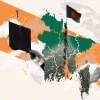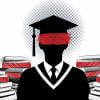MBBS admission test preparation tips shared by medical students

My MBBS admission journey was not a pleasant experience. This lingering bitter aftertaste is something I still cannot shake off because I made it to a public medical college only after my second attempt. The 5-mark deduction – because of sitting for the medical admission test for the second time – made it even worse, especially in an environment where even a difference of 0.25 makes a significant impact. Not getting in the first time was a huge shock for someone like me who always dreamt of wearing that white doctor's apron.
However, one thing that helped me prepare for my second and final attempt was that I knew why I did not make it the first time. My momentary lapse in the exam hall, where I failed to keep my composure, shattered my dreams. During my second attempt, I knew I had to gather my strength, pick up the pieces, and stage a comeback.
As a student from the National Curriculum but of the English version background, there were conveniences in some aspects because the textbooks to be followed were the same as they were for the Bangla version students. However, some textbooks were not available in English. For example, the Botany textbook by Abul Hasan and the Zoology textbook by Gazi Azmal were unavailable in English. Even the other textbooks that were available in English had some information gaps compared to their original Bangla counterparts. Considering this, I opted to study the Bangla version textbooks, a decision that not only saved me time but also proved beneficial in bridging these informational disparities. Although adapting to the Bangla terminologies posed a challenge, regular practice helped me gradually become used to them.
The MBBS admission test is a 100-mark multiple choice question (MCQ) exam and 0.25 marks are deducted for every wrong answer. It comprises 30 questions from Biology, 25 questions from Chemistry, 20 questions from Physics, 15 questions from English, and 10 questions from General Knowledge. The allotted time for the exam is one hour, translating to roughly 36 seconds per question. The key to success lies in maintaining composure right from the very beginning and ensuring a clear understanding of each question to avoid confusion with the options provided.
There's nothing more effective than regular practice for adapting to the demands of the test, as achieving accuracy is nearly impossible without it. On a personal note, I simulated the exam conditions at home by taking mock tests on OMR sheets, complete with a timed setting to address the challenge of cold hands. In the month leading up to the admission test, I consistently took mock exams and diligently corrected any errors. Rather than panicking when unable to answer a question correctly, I referred to the textbooks, marked the particular question or topic for future attention, and ensured I learned from the mistake. In addition to textbook study, solving previous years' MBBS admission test questions proved invaluable.
Remembering that 0.25 marks are deducted for every wrong answer, there's a universal strategy you can opt for: if you're confused between two options after cancelling out the other two, answer it. However, if you're confused about all the options, the right call would be not to answer that particular question. Sticking to this strategy helped me a lot. Whenever there was a question I was unsure about, I used this technique.
Of course, everyone has different experiences and varying approaches to tackling the MBBS admission test. Rafsan Zaman, a first-year student at Dhaka Medical College, who secured the first position in the national merit for the session 2022-23, shares his experience, "My admission journey began while I was still in college, but I officially dedicated myself to preparation after my HSC exams. It was indeed a challenging time for me, much like every other admission candidate, but I made sure not to compromise on my diet and sleep schedule, as these were the factors that kept me going. I strived to maintain my routine and regularly attended classes, taking daily exams. I also tried to identify my shortcomings in these exams and never really fretted about the marks I received, because I knew it was part of my practice. I also believe luck played a significant role, but I made sure to give it my best and left the rest to the Almighty."
Imran Mahmood, a fourth-year student at Shaheed Suhrawardy Medical College, took the MBBS admission test in 2021, a year marked by the widespread COVID-19 pandemic and nationwide lockdown. He says, "After the cancellation of our HSC exams, we were uncertain about the way forward. Coaching classes moved online and so did the exams. It was truly frustrating to study all day at home, especially during the last few days before the admission test. Despite the challenges, I persevered and successfully reached my destination."
Every year, thousands of stories like these are made. It is crucial to understand that success boils down to accuracy and performing at one's best within individual capabilities. The methods to achieve the same result vary from individual to individual. Therefore, it is important to discern what works for you to attain your desired outcome. Our human potential cannot be assessed within the confines of a one-hour examination, nor can it be fully understood. As we prepare for admission tests like this, it is imperative to acknowledge the broader spectrum of human potential, one that extends far beyond the limitations of a standardised test.
Purna is a first-year student at Shaheed M. Monsur Ali Medical College, Sirajganj.

 For all latest news, follow The Daily Star's Google News channel.
For all latest news, follow The Daily Star's Google News channel. 










Comments